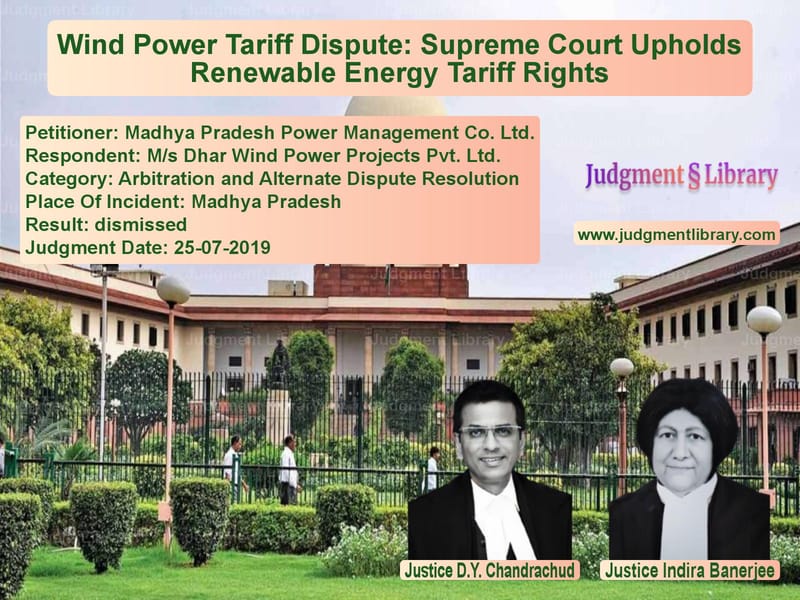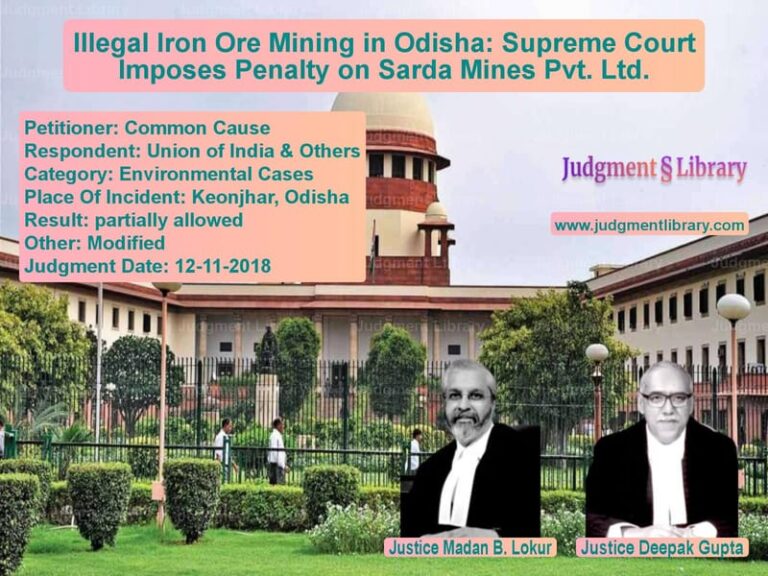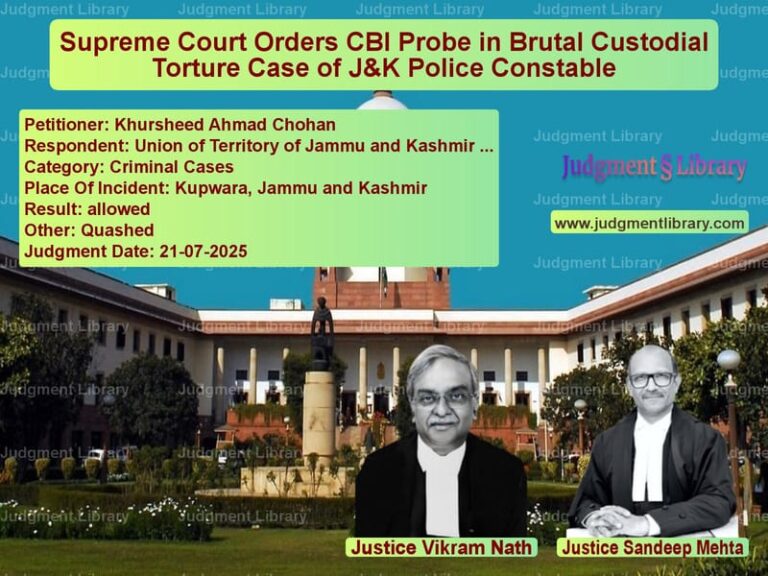Wind Power Tariff Dispute: Supreme Court Upholds Renewable Energy Tariff Rights
The case of Madhya Pradesh Power Management Co. Ltd. vs. M/s Dhar Wind Power Projects Pvt. Ltd. revolved around the issue of tariff determination for a wind power project in Madhya Pradesh. The primary dispute was whether the tariff order issued by the Madhya Pradesh Electricity Regulatory Commission (MPERC) in 2013, which offered a higher tariff rate, applied to the respondent’s project or whether the reduced tariff from the 2016 order should be enforced. The Supreme Court was tasked with interpreting the agreement and regulatory framework to determine whether the respondent was eligible for the higher tariff.
In 2012, the Government of Madhya Pradesh introduced the Madhya Pradesh Wind Power Project Policy, under which renewable energy developers were encouraged to establish wind power projects in the state. M/s Dhar Wind Power Projects Pvt. Ltd. applied for permission to set up a 15 MW wind power project and received approval. The company started construction and claimed to have completed the project by March 2016. The MPERC had earlier issued a tariff order on 26 March 2013, fixing the tariff at Rs. 5.92 per unit for projects commissioned before 31 March 2016. However, a new tariff order issued on 17 March 2016 reduced the tariff to Rs. 4.78 per unit for projects commissioned on or after 1 April 2016.
Arguments of the Petitioner
The Madhya Pradesh Power Management Co. Ltd. (MPPMC), represented by its legal counsel, challenged the respondent’s claim to the higher tariff, arguing:
“The respondent’s project was not commissioned before 31 March 2016, and therefore, the new tariff order of 2016 should apply.”
The petitioners further argued:
- The actual injection of power into the grid by the respondent’s project began on 1 April 2016, making it subject to the revised lower tariff.
- The commissioning certificate issued on 31 March 2016 was incomplete and did not confirm that power was actually being supplied to the grid.
- The MPERC tariff order explicitly stated that projects commissioned on or after 1 April 2016 would be subject to the new tariff.
- Allowing the respondent to avail the higher tariff would set a wrong precedent and lead to financial loss to the state.
Arguments of the Respondent
The respondent, M/s Dhar Wind Power Projects Pvt. Ltd., contested the petition, stating:
“The project was ready for commissioning before 31 March 2016, and any delay in the injection of power was due to procedural delays beyond the control of the respondent.”
The respondent further contended:
- The project was completed by 31 March 2016, and all regulatory approvals were obtained within the time frame specified in the 2013 tariff order.
- The petitioner arbitrarily refused to execute the Power Purchase Agreement (PPA) at the earlier tariff rate.
- The revocation of the commissioning certificate was done unilaterally and in violation of due process.
- Regulatory delays should not be held against the developer, and the benefit of the earlier tariff should be granted.
Supreme Court’s Verdict
The Supreme Court, with Justices D.Y. Chandrachud and Indira Banerjee presiding, ruled in favor of the respondent, stating that the project was entitled to the earlier tariff rate. The Court observed:
“The revocation of the commissioning certificate was improper and lacked procedural fairness. The respondent is entitled to the benefit of the tariff order applicable at the time of commissioning.”
The Court ruled:
- The project should be considered as commissioned before 31 March 2016.
- The respondent is entitled to the higher tariff of Rs. 5.92 per unit.
- The MPPMC must execute the PPA with the respondent at the earlier tariff rate.
- The High Court’s judgment was affirmed, and the appeal was dismissed.
Legal Precedents Considered
The Court relied on several important precedents to reach its decision, including:
- Energy Watchdog vs. CERC (2017) – Emphasized that regulatory certainty is necessary for the financial viability of power projects.
- Gujarat Urja Vikas Nigam Ltd. vs. Solar Semiconductor Power Co. (2017) – Held that tariff policies must be enforced fairly to promote renewable energy investments.
Key Takeaways from the Judgment
- Renewable energy developers are entitled to certainty regarding tariff policies and should not face arbitrary rejections.
- The procedural fairness in revocation of commissioning certificates is crucial.
- Electricity boards must adhere to the terms of approved tariff orders and cannot unilaterally impose lower rates.
- Legal certainty in renewable energy contracts fosters investor confidence in the sector.
Impact of the Judgment
This ruling is significant for the renewable energy sector in India as it ensures:
- Investor Confidence: Renewable energy developers now have greater assurance that tariff agreements will be honored.
- Regulatory Stability: Power companies and developers must adhere to the regulatory framework without arbitrary changes.
- Promotion of Green Energy: The judgment strengthens India’s commitment to renewable energy by protecting the interests of developers.
This ruling reinforces the principle that regulatory authorities must follow due process in determining eligibility for tariff benefits and cannot arbitrarily change conditions after project completion.
Petitioner Name: Madhya Pradesh Power Management Co. Ltd..Respondent Name: M/s Dhar Wind Power Projects Pvt. Ltd..Judgment By: Justice D.Y. Chandrachud, Justice Indira Banerjee.Place Of Incident: Madhya Pradesh.Judgment Date: 25-07-2019.
Don’t miss out on the full details! Download the complete judgment in PDF format below and gain valuable insights instantly!
Download Judgment: Madhya Pradesh Power vs Ms Dhar Wind Power Supreme Court of India Judgment Dated 25-07-2019.pdf
Direct Downlaod Judgment: Direct downlaod this Judgment
See all petitions in Arbitration Act
See all petitions in Dispute Resolution Mechanisms
See all petitions in Institutional Arbitration
See all petitions in Judgment by Dhananjaya Y Chandrachud
See all petitions in Judgment by Indira Banerjee
See all petitions in dismissed
See all petitions in supreme court of India judgments July 2019
See all petitions in 2019 judgments
See all posts in Arbitration and Alternate Dispute Resolution Category
See all allowed petitions in Arbitration and Alternate Dispute Resolution Category
See all Dismissed petitions in Arbitration and Alternate Dispute Resolution Category
See all partially allowed petitions in Arbitration and Alternate Dispute Resolution Category







